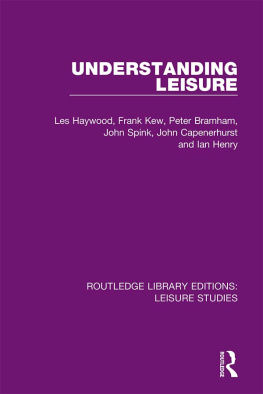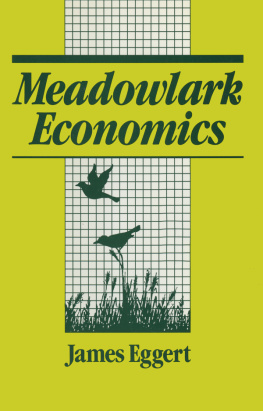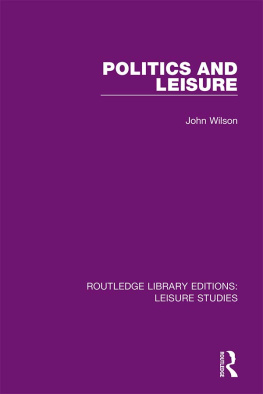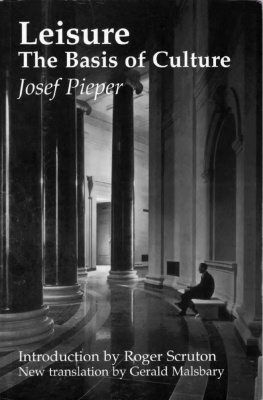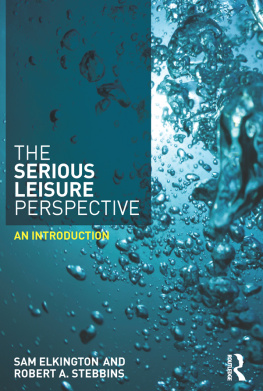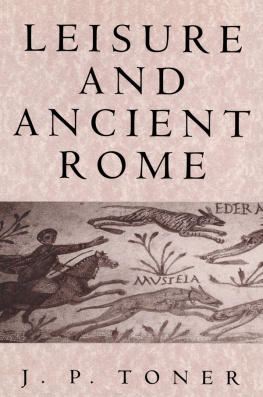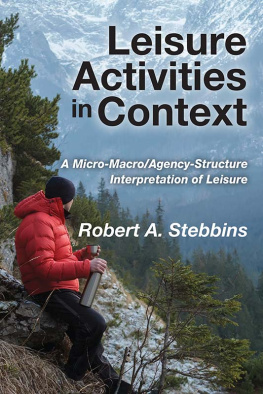ROUTLEDGE LIBRARY EDITIONS:
LEISURE STUDIES
Volume 2
THE PROBLEM OF LEISURE
THE PROBLEM OF LEISURE
HENRY DURANT
First published in 1938 by George Routledge & Sons Ltd.
This edition first published in 2019
by Routledge
2 Park Square, Milton Park, Abingdon, Oxon OX14 4RN
and by Routledge
52 Vanderbilt Avenue, New York, NY 10017
Routledge is an imprint of the Taylor & Francis Group, an informa business
1938 Henry Durant
All rights reserved. No part of this book may be reprinted or reproduced or utilised in any form or by any electronic, mechanical, or other means, now known or hereafter invented, including photocopying and recording, or in any information storage or retrieval system, without permission in writing from the publishers.
Trademark notice: Product or corporate names may be trademarks or registered trademarks, and are used only for identification and explanation without intent to infringe.
British Library Cataloguing in Publication Data
A catalogue record for this book is available from the British Library
ISBN: 978-0-367-11036-9 (Set)
ISBN: 978-0-429-24268-7 (Set) (ebk)
ISBN: 978-0-367-13300-9 (Volume 2) (hbk)
ISBN: 978-0-429-02578-5 (Volume 2) (ebk)
Publishers Note
The publisher has gone to great lengths to ensure the quality of this reprint but points out that some imperfections in the original copies may be apparent.
Disclaimer
The publisher has made every effort to trace copyright holders and would welcome correspondence from those they have been unable to trace.
THE PROBLEM OF LEISURE
By
HENRY DURANT
B.SC. ECON.
First published 1938
Printed in Great Britain by T. and A. CONSTABLE LTD.
at the University Press, Edinburgh
TO
RUTH DURANT
ACKNOWLEDGEMENTS
To Mr. H. L. Beales my first thanks are due. The conventional phrase, without whose assistance this work could not have been achieved, happens, in his case, to be literally true.
The Hon. Mary Best, Margaret C. Bottomley, Olive Durant, my sister, Molly Mortimer, Olga Servagnet, P. C. Branwhite, L. H. Bishop and A. C. Ellis, have each been exceedingly helpful in supplying material. My very grateful thanks go to them all.
Students at Toynbee Hall have given great assistance, not only by the discussions I have had with them, but in collecting valuable information. Other acknowledgements appear in the text, as showing the source of the facts cited.
The chief and largest debt remains: it is acknowledged in the dedication.
H. D.
THE sharp division which exists for the vast majority of people between their work and their leisure is the outstanding aspect of the problem as it presents itself to-day. This division is not given a priori: it has come about in the course of time and is the result of particular historical circumstances. Probably the concept of leisure as something apart from and opposed to work was unknown until there arose a group in society which did not need to labour in order to ensure its livelihood. And the evidence suggests that such groups have not existed in every society. Since the change can be found in rural areas, to refer simply to the growth of cities is not sufficient. Other factors, detailed in the following pages, have also to be taken into account for a complete explanation. There is agreement, however, that at one time the present separation between work and leisure did not exist and that it has come about in the course of historical evolution. Like many other historical processes it is not complete. Even to-day difficulties often arise in trying to show the exact line of demarcation. Yet having stressed the existing division, it is equally necessary to underline that in fact work and leisure are closely related. As different aspects of a single whole, mans life in society, they are inseparably intertwined.
It is significant that the Greeks did not evolve a separate and distinct term for leisure The word they used meant also school, an identity which throws a flood of light on their conception of living.
Amusements, Public, Ida Craven, Encyclopdia of the Social Sciences, London, 1931.
To-day leisure plays a greater rle than at any previous time. On all sides educationalists and social workers say that the urgent questions are what people do with their spare time, how to guide their activities into the right channels and particularly how to tackle the juveniles in this context. The present attitude contrasts strangely with that of a few years ago. Little or no public discussion then took place. and whilst many countries in Western Europe, as well as America, were busily discussing and investigating the question of leisure there was no debate of any kind in England. Now all is changed. The difficulties and perplexities arising from a greater number of persons than ever before having means and energy at their disposal to utilize during their free hours, are engaging the attention of educationalists, social workers and all those whose business it is to attend to the working of society.
Thus when in 1928 two sociologists from America came to England, to investigate leisure they hardly ever encountered any signs of a realization in any large bodies of public opinion of a problem of leisure occupation and its various dangers and possibilities. May, Herbert, and Petgen, Dorothy, Leisure and Its Use, New York.
Spurr, Frederic C., The Christian Use of Leisure (London, 1928): Joad, C. E. M., Diogenes or the Future of Leisure (London, 1927): The Report of C.O.P.E.C. on Leisure, 1924: Boyd and Ogilvie, The Challenge of Leisure (London, 1936): C. Delisle Burns, Leisure in the Modern World (London, 1935): Eric Gill, Work and Leisure (London, 1935).
Why should the opportunity for the vast majority of people to have time to spend, time to enjoy, time to develop their own private interests, be regarded as a problem, one almost said a danger? Usually the answer is given in terms of a faulty educational system. The remedy proposed, therefore, is to train the individual not for his work, which it is agreed makes little demands on his capacities, but for the business of living a rounded life. Little argument is necessary to show that such a diagnosis does not go to the root of the problem. The educational system in Great Britain is, as elsewhere, the reflection of deep social forces which determine its shape and condition its impact. If the education given is faulty then this fault must itself be explained in terms of other and more fundamental characteristics of our society. Accordingly it is to these that we must look.


